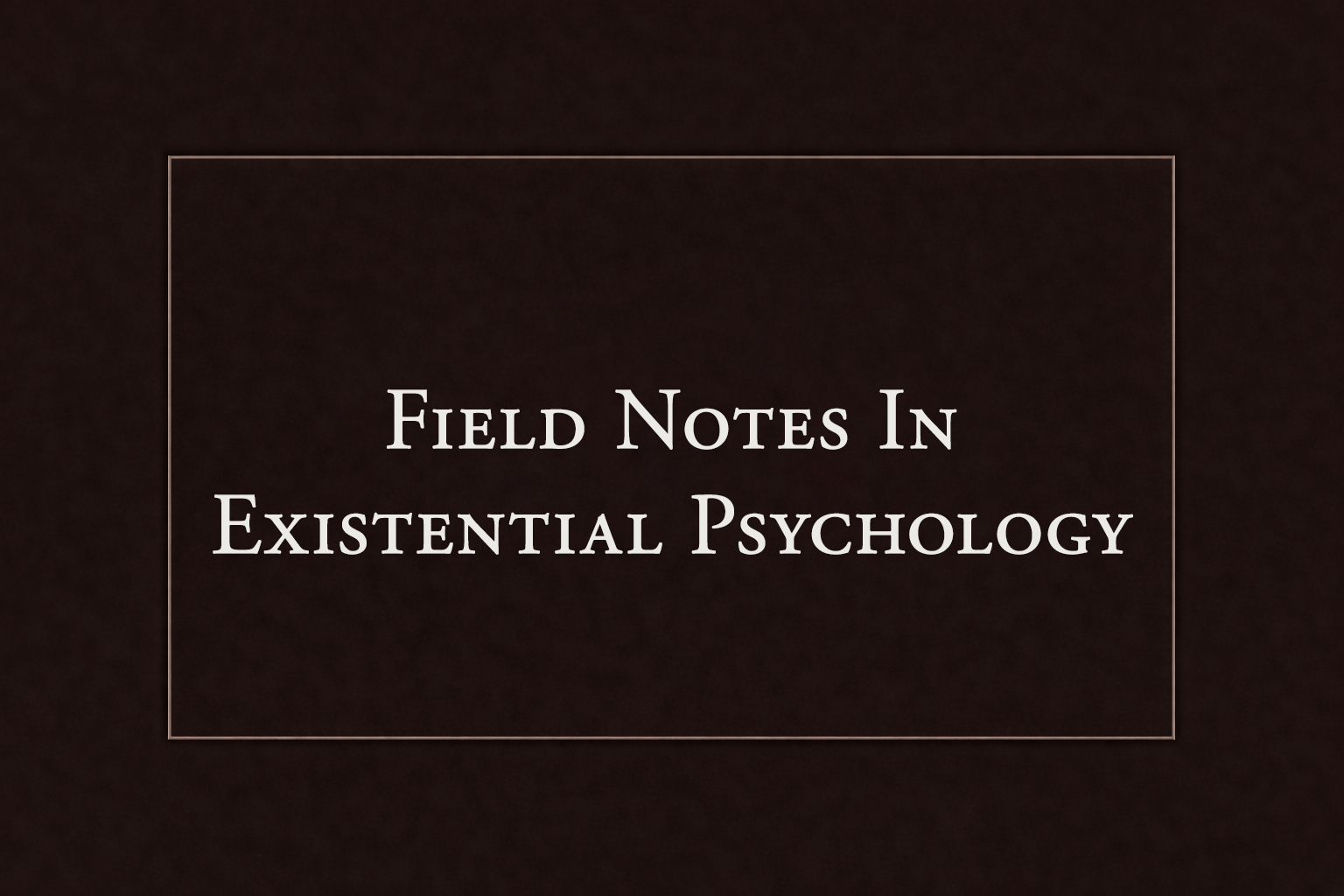
Field Notes in Existential Psychology
Reflections on meaning, uncertainty, and how people orient themselves when life resists explanation.
About this series
This series explores existential questions through a psychological lens, focusing on meaning, freedom, mortality, and uncertainty. The writing is reflective and interpretive rather than instructional or theoretical. These pieces follow lines of inquiry as they unfold, without requiring resolution or conclusion. The aim is not to solve existential problems, but to examine how people live inside them.
The Meaning domain clarifies how coherence and direction are built across time. Field Notes is what it looks like when that process is happening in real conditions: partial, unresolved, and still psychologically consequential. For the conceptual framework that grounds this series, see Meaning.
The Maturity of Return: When Freedom Does Not Cancel Belonging
This essay examines Marta Keen’s Homeward Bound as a psychological architecture of maturity. Through lyrical analysis and Sir Bryn Terfel’s performance, it explores autonomy, belonging, calling, and return as developmental tensions rather than sentimental themes. The piece argues that adulthood requires integration: the capacity to pursue vocation without severing attachment, and to remain connected without forfeiting authorship.
The Day the Internet Stopped Feeling Like a Room
This essay examines how early social media functioned as a shared social room built on casual presence and low-stakes acknowledgment, and how that warmth quietly disappeared. Through the lenses of irony, context collapse, branding, and emotional withdrawal, it explores how ordinary sharing became embarrassing, public spaces cooled, and connection migrated elsewhere—leaving behind content without contact.
Belief as a Human Response
Belief is often discussed as doctrine or conviction, but its deepest psychological role emerges under existential pressure. This essay explores how religion and spiritual practice function as meaning-making responses to illness, loss, near-death experiences, family vulnerability, aging, and mortality. Rather than defending or dismissing belief, it examines how humans use symbolic frameworks to remain coherent when life fractures.
When Anger Has Nowhere to Go
Anger is often treated as a flaw or a failure of control. This essay explores a quieter truth: much of modern anger is the residue of blocked agency. When movement, authorship, and responsibility are deferred too long, anger stagnates rather than explodes. Read as a psychological field note on how anger becomes a signal asking to be translated back into action.
Feeding the Wrong Self: Shakespeare’s Sonnet 146 and the Quiet Crisis of Modern Identity
Shakespeare’s forgotten Sonnet 146 becomes a map of the modern existential crisis. This Field Notes entry explores the tension between the outer self we perform and the inner life we neglect. It’s a reflection on identity, mortality, and the quiet turning point when a person realizes they’ve been feeding the wrong self. A meditation on depth, meaning, and psychological truth.
When the Myth Fails — The Psychology of Belief Collapse and Existential Disillusionment
When absolute belief meets contradiction, something inside the mind gives way. This essay examines the psychology of belief collapse—the confrontation between myth and reality, and what follows when certainty dies. Through the lenses of religion, magical thinking, and existential psychology, it explores how disillusionment can destroy coherence or deepen awareness, and what it means to rebuild meaning after faith fails.
Existential Confrontation in the Age of Artificial Companions
A late-night conversation with Alexa becomes a study in modern reflection. This essay explores why we ask machines the questions we can’t ask each other, how artificial listeners contain anxiety, and what it means to find coherence in responses that don’t truly understand. In an age of simulation, the device becomes a mirror: not a source of empathy, but a structure for meaning. The act of asking is the point; the echo helps us hear our own mind.
Living Inside the Ongoing: A Psychological Reflection on Time, Routine, and the Quiet Continuity of Being
A meditation on time, familiarity, and the quiet psychology of repetition. Living Inside the Ongoing explores how consciousness settles into the rhythm of days—the blur of tasks, the comfort of order, and the strange beauty of continuity itself. It reflects on what it means to keep creating, to leave something behind, and to live with awareness as the light begins to change.
What is Existential Anxiety?
Existential anxiety isn’t a disorder—it’s the human condition felt in motion. This essay explores the quiet unease that surfaces when life feels both full and hollow, the awareness that freedom and limitation coexist. Through psychology and philosophy, it reframes anxiety as a sign of consciousness itself—a signal not to be cured, but understood as the pulse of being alive.
Through the Classroom Lens: Existential Liminality Explained
In this classroom lecture, Dr. Matthew Collins introduces students to RJ Starr’s paper on existential liminality—the suspended state of identity disruption and transformation. The talk brings Starr’s theoretical work to life, showing how anthropology, existential psychology, and cultural change converge to illuminate the in-between spaces we all experience.
Living Where Your Feet Are: An Existential Antidote to Cultural Chaos
In a culture drowning in noise and outrage, it is easy to feel powerless or consumed by despair. Existential psychology reminds us that meaning does not come from waiting for calm but from how we choose to live in the present. To live where your feet are is to reclaim freedom, ground yourself in daily life, and resist the pull of abstraction with presence, responsibility, and authenticity.
The Psychology of Medical Sovereignty: Health Without Fear
What does it mean to live in a body you trust? This essay explores medical sovereignty as a psychological posture—not rebellion, not denial, but a quiet refusal to live in fear. When peace is treated as negligence, self-trust becomes radical.
The Ache of Agency: Why Having a Choice Doesn’t Always Feel Free
Even when life offers you choices, freedom doesn’t always feel free. This essay explores the ache of agency—the quiet weight of knowing that every decision shapes what will be, and erases what could have been. When the ability to choose brings dread instead of clarity, what does that say about how we understand freedom?
When the Past Knocks Softly: On Refusing to Re-enter Old Versions of Yourself
Not every reconnection is harmless. Sometimes, when people from our past reach out, it reactivates versions of ourselves we’ve spent years outgrowing. This reflection explores the quiet power of saying no; not from bitterness, but from clarity. Because some chapters don’t need to be reopened, even if others still miss the scenery.
Nothing’s Wrong, But I’m Not Okay
You’re functioning, doing what needs to be done—yet something feels off. This reflection explores the quiet ache of emotional disconnection that can arise even when life is stable. It’s not crisis, it’s misalignment. And it deserves attention, not shame.
The Quiet Crisis of the Emotionally Unseen
Some people seem fine on the surface—capable, kind, composed—but quietly ache to be seen more deeply. This reflection explores the psychological toll of being emotionally unseen, why it often affects high-functioning people, and how to begin reclaiming visibility without shame.
Why Are Mornings So Emotionally Charged?
Mornings can feel heavier than they should. Even when life is calm, waking up often brings anxiety, longing, or dread. This reflection explores why returning to consciousness is emotionally charged—and how biology, memory, and the weight of identity all quietly converge in those early hours.
You Made Me Feel: The Lie That Keeps Us Stuck
“You made me feel…” is a phrase we use without thinking, but it carries a lie at its core. Our emotions may be shaped by others, but they are authored within. This essay explores the emotional and existential cost of outsourcing responsibility for how we feel—and what it means to reclaim it.
I Miss Who I Was When Life Was Simpler
Sometimes it’s not the past we miss, but the version of ourselves who lived it. This reflection explores the grief of outgrowing yourself, the ache of losing inner simplicity, and the quiet hope of reconnection—not by going backward, but by remembering who you were before life asked you to become so guarded.
The Fear of a Life Unremarkable
Many of us carry a quiet fear that our lives won’t amount to anything memorable—not because we crave fame, but because we want to matter. This entry explores how the myth of exceptionalism distorts meaning, why visibility gets mistaken for worth, and what it truly means to live a remarkable life that no one may ever applaud.

